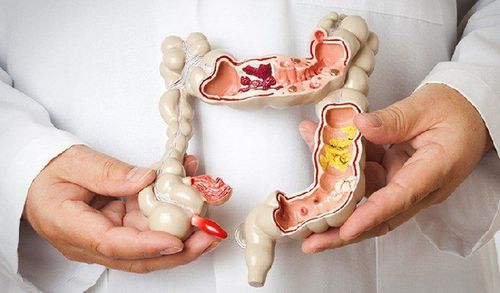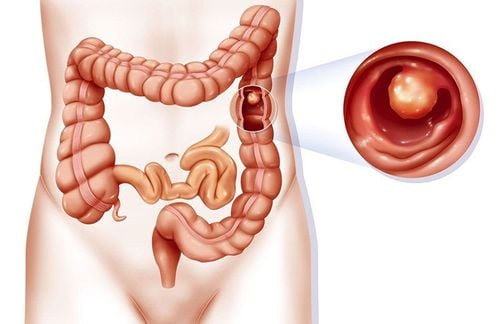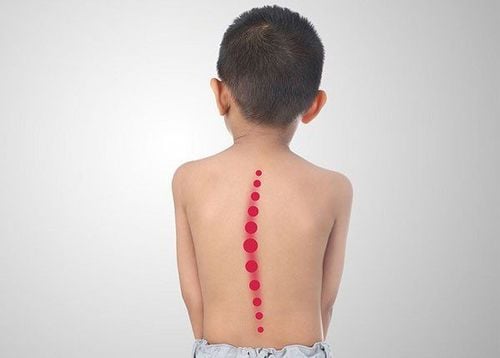This is an automatically translated article.
Double bowel cyst is a congenital anomaly when above a normal segment appears another segment of intestine of similar nature. However, when this double bowel segment causes pathology, surgical intervention will always be indicated. Compared with laparoscopic surgery, surgery to treat double bowel with open surgery creates a number of favorable conditions and will be considered as the first indication in lesions that show its advantages.
1. What is a double bowel cyst?
Double bowel cyst is a congenital malformation in which abnormal appendages of the gastrointestinal tract appear, which can occur anywhere from the esophagus to the rectum, most commonly the small intestine (ileum). colon and jejunum). These sections have a generally intestinal-like structure, attaching to and sharing a blood supply. A child can have multiple bowel segments at once, which occurs in 10-15% of cases.
Double bowel structures may be anastomosed to the normal intestinal tract or not at all. Therefore, the incidence of double bowel is about 1 in 4,500 live births, and children are born with pre-existing double bowel cysts, but presenting with detectable symptoms is common until the child is two years old. year old. Some children may have additional abnormalities of the spine, genitals, and urinary tract.
Cases found are mainly due to anastomosis, double bowel segments can form cysts. They still have a digestive mucosa, so they are still able to excrete fluid. Thus, the double bowel becomes a double bowel capsule filled with distended fluid. In cases where these digestive juices are active, causing perforation of the cyst, the child will have an acute surgical abdomen. Emergency surgery should be instituted, localizing the rupture, avoiding complications of total peritonitis or abdominal bleeding, sometimes even endangering the life of the child.
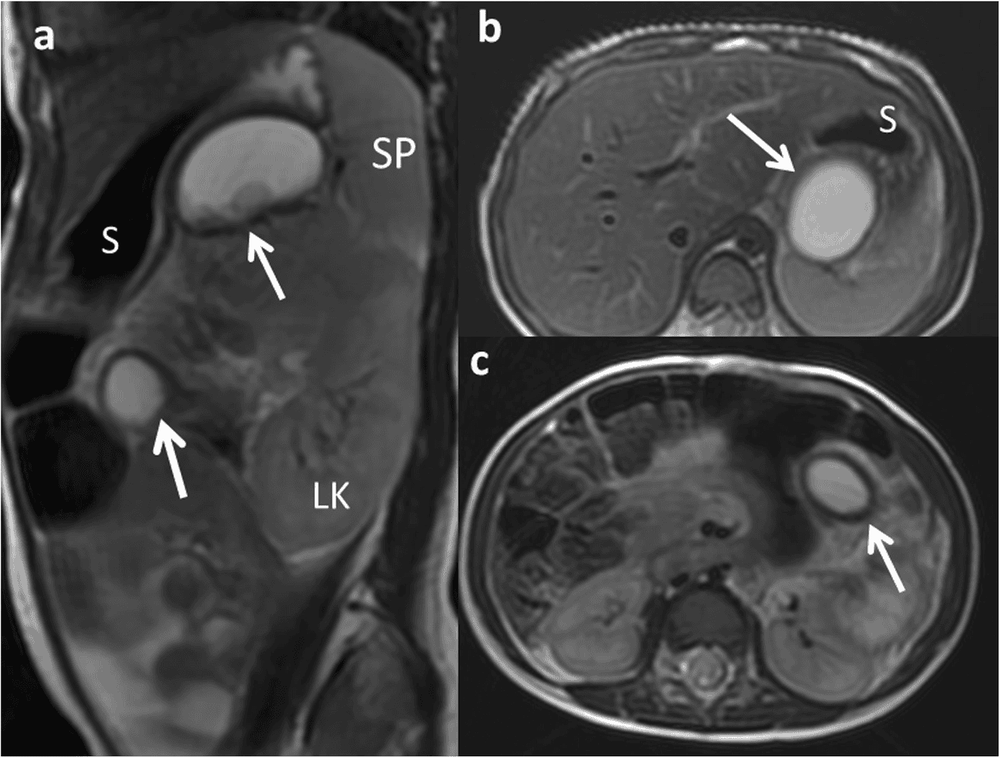
Nang ruột đôi thường xảy ra ở ruột non, đây là dị dạng bẩm sinh nhưng có khi đến tận 2 tuổi mới phát hiện ra bệnh.
2. Symptoms of children with double intestinal cysts
The symptoms of a child with a double bowel cyst will depend on the size, location and nature of the lining lining the bowel. Cysts lined with gastric tissue can cause intestinal perforation and bleeding because of the secretion of highly acidic gastric juices.
Other symptoms of double bowel cysts such as frequent fussiness, poor feeding, refusal to suckle, palpable abdominal mass, abdominal distension, nausea, vomiting, blood in stool...
3. What tests are done to diagnose double bowel cysts?
If the double bowel cyst is located in the chest, which is the duplication of the esophagus, the chest x-ray may show a mass in the posterior thoracic region. The image will be more clearly seen if the bowel is anastomosis and when x-rays are taken with oral contrast.
With double bowel cysts on the intra-abdominal segments, ultrasound, computed tomography, or magnetic resonance imaging will reveal a solid (tubular or spherical) internal mass that is fluid-filled and tight. into the adjacent intestine. However, these findings can sometimes be nonspecific, easily confused with adjacent adjacent loops.
4. How to treat double bowel cysts in children?
In duodenal cystic disease, the use of drugs cannot improve the condition.
Instead, surgery is always indicated. The timing of double bowel surgery will depend on the child's condition. Specifically, emergency surgery is indicated when the child is admitted to the hospital because of a surgical diagnosis of the abdomen due to a double bowel cyst.
Besides, surgery to treat double bowel will be chosen in two ways, laparoscopic or open surgery. Each method of surgery has certain advantages and disadvantages. Therefore, the medical condition will be the determining factor in which way; At the same time, other factors that need to be considered are the structural nature of the damaged bowel as well as possible pathological complications.
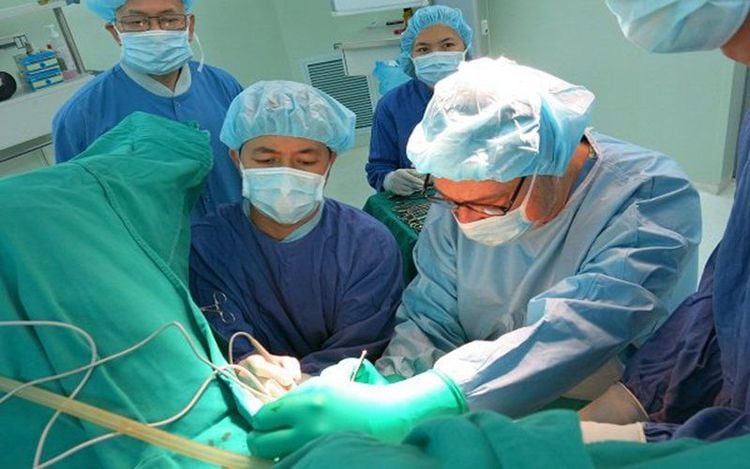
Mổ nội soi là một trong 2 cách phẫu thuật để điều trị nang ruột đôi
5. Surgery to treat double bowel with open surgery
Unlike laparoscopic surgery, open double bowel surgery will be performed through a sizable surgical area created by skin incisions on the body. The location and size of the double bowel will help the surgeon estimate the incision line. Specifically, if the double bowel is affecting the upper part of the digestive tract in the mouth or throat area, the surgery will be done through the mouth or through the neck incision. Similarly, the incision site will be in the chest wall, passing between the two rib branches for the upper esophageal distal segment, and in the abdominal wall with the rest of the alimentary canal.
Regardless of the open surgical site, to begin surgery, the child is prepared according to a similar preoperative procedure. In particular, the child will be completely fasted from the night before the surgery and cleaned with an antiseptic solution, changed into specialized clothes. Right before the time of incision, because this is an infectious surgery, all patients are prescribed prophylactic antibiotics to reduce the risk of infection. Next, the child will be given general anesthesia and mechanical ventilation through a breathing tube.
During open surgery, the main task of the surgeon is to find and remove the damaged and diseased double intestine, and reassemble the two ends of the normal intestine. At the same time, the doctor also reviewed the entire remaining intestinal segment within the surgical field, to make sure that there was no remaining double intestine, in order to minimize the occurrence of similar acute conditions in the future.
Next, the abdominal cavity is also drained of inflammatory fluid, and flushed with water if complications have occurred. All these stages are carried out very smoothly and easily with open surgery to treat double bowel. This is the biggest advantage of this treatment over laparoscopic surgery.
Finally, the surgical field is closed and the incision is sutured with skin sutures. The abdominal wall will be disinfected and the wound will be bandaged. The child will continue to be monitored in the recovery room until returning to the room.
6. How to take care of children after surgery to treat double intestines with open surgery
In the first few days after surgery, the child will be in a lot of pain and need pain medication as prescribed by the doctor. At the same time, in order to create conditions for the intestine to rest, have less contractions, reduce excretion and speed up the healing of the junction, the child needs to be nourished by parenteral nutrition. As soon as children have an appetite, can pass stools and hear bowel movements, parents can gradually introduce children to the oral diet. Start with sugar water, thin porridge, milk... and gradually increase the complexity of the food, depending on the child's tolerance rate.
Besides, children need to limit activities at bed and move gently in the room, around the house, limit contact with water. Running, jumping, and vigorous exercise can cause trauma to the uncut incision. At the same time, parents need to be instructed on how to take care of their child's wounds at home, change the dressing every day, and have the child re-examined for stitches by appointment.
Similar to other surgeries in general, postoperative care for children also includes monitoring and detecting complications from surgery, such as incision bleeding, wound infection, intestinal obstruction due to scar tissue healing. cause narrowing, leaky gut at the junction... If the child has any abnormal signs, parents need to take their child to an early examination for intervention. In some cases, surgical repair is sometimes necessary.
In summary, unlike other common surgical diseases, in double bowel cysts, open surgery always has certain advantages compared to laparoscopic methods. Thanks to the large surgical field and free range of operation, the doctor conducting open surgery will control and eliminate double intestinal lesions along the length of the digestive tract more effectively and thoroughly.
References: ncbi.nlm.nih.gov; surgjournal.com
MORE:
Routine antenatal check-up - protect your baby from the very first moment Birth defect screening test Difference between screening test and diagnostic test for birth defects





